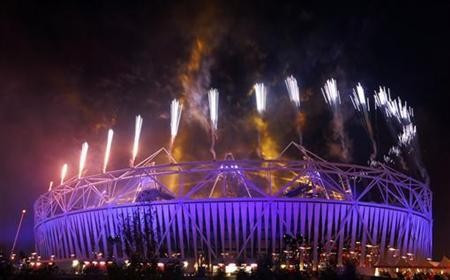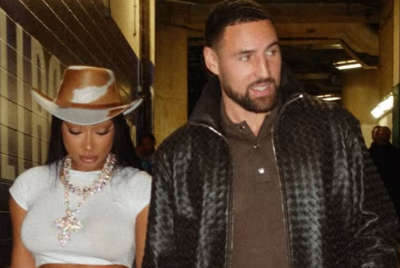London 2012: Coldplay Bring down Curtain on Spectacular Paralympics [VIDEO]
British summer of sport officially comes to a close with festival of flame inside Olympic Stadium

The British summer of sport has officially come to a close as a festival of flame inside the Olympic Stadium drew the curtain on what many have called the greatest Paralympics ever.
After an opening ceremony that featured Stephen Hawking's narration of the beginning of the universe and the wonders of nature, the closing ceremony instead focused on the best of man, the ability to use what is around you to achieve greatness, and the human spirit's capacity to overcome any obstacle.
The ceremony started with a steam-punk procession that appeared straight out of Mad Max, as cannibalised cars darted around the stadium shooting out flame. The armed forces and the military charity Help for Heroes were celebrated in a speech by ex-serviceman Rory MacKenzie as Captain Luke Sinnott, a double amputee who lost both legs from an IED bomb blast in Afghanistan, climbed to the top of the flag pole to hoist the union flag.
Coldplay dazzle in closing performance
The main performance was a concert by British rock band Coldplay. Accompanied by special guests Rihanna and Jay Z, the group performed a number of their greatest hits such as Clocks, Yellow and Paradise.
As the band belted out their songs, a cast of 1,200 performers put on a spectacular display that featured at one point dancers performing with flames around the burning face of a "sun king". Lord Sebastian Coe emphasised the United Kingdom's ability to create something great when he said, "London 2012, made in Britain".
The flame was extinguished by two members of Paralympics GB, Ellie Simmonds and Jonnie Peacock. The 200 copper petals that together formed the Paralympic cauldron will be distributed to each participating nation as a memento to symbolise the lasting legacy of the games.
The Paralympic flag was passed on from London mayor Boris Johnson to the mayor of Rio de Janeiro, Eduardo Paes, as the beachside metropolis prepares to stage the next Paralympic games in 2016. The handover was celebrated by a collection of both disabled and non-disabled dancers putting on a performance that blended hip-hop, freestyle and samba.
The greatest ever Paralympics
As the fireworks erupted around the Olympic Park and Tower Bridge, many were left to reflect on what has been an incredibly successful Paralympic games. Unlike the ancient tradition of the Olympics, the Paralympics are less than 60 years old, staged initially by disabled war veterans at Stoke Mandeville Hospital in Buckinghamshire.
Organisers say 2.7 million Paralympic tickets were sold, beating footfall projections by 200,000 and revenue targets by a phenomenal £10m. Never before has disability been given such recognition by the British public, with athletes such as David Weir, Ellie Simmonds and Sarah Storey now household names.
Perhaps the success of the Paralympics in the British mindset was summarised best by president of the International Paralympic Committee Sir Phillip Craven, who recounted a story of five year-old George Glen, who from looking at a drawing of a pirate said, "well he only has one leg, so he must be an athlete".
As Seb Coe noted in a rousing speech: "The Paralympians have lifted the cloud of limitation."
Victory Parade
After the end of 10 days of Paralympics action last night, Britain's athletes will get the chance to do one final lap of honour as they take part in a parade through the streets of London under what has been labelled "Our Greatest Team". Starting from 1.30 at Mansion House, 800 British and Olympic and Paralympic athletes will travel on 21 open-top floats towards the finish at the Queen Victoria Memorial. Thousands of people are expected to cheer on the Team GB and Paralympics GB athletes that managed to win 185 medals, 63 of them gold.
Boris Johnson said: "This summer our great city has hosted an unbelievable spectacle of sport and thousands will want to celebrate the achievements of our athletes by coming to the parade."
A lasting legacy
The overwhelming support and enthusiasm for the games has been astonishing, with the fact that London managed to stage such a confident and positive games only a year after the riots is a remarkable achievement. And with that comes something that is frankly alien to British society, a genuine feeling of optimism that the greatness we've witnessed these past two months can be emulated for future generations.
The closing ceremony ended a summer of sport that will be entrenched in the minds of a generation and many will hope the games will leave a lasting positive impression on the British people. Danny Boyle's brilliant opening ceremony focused on how the industrial revolution changed British society forever. London 2012 could well have done the same.
© Copyright IBTimes 2025. All rights reserved.




















